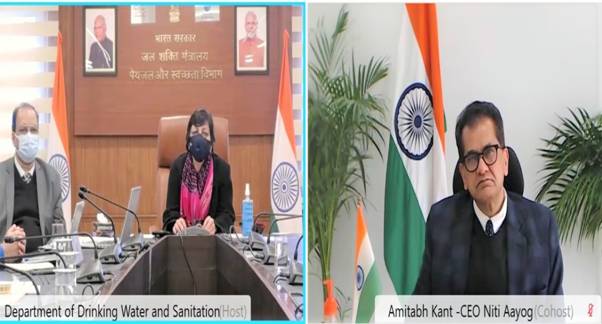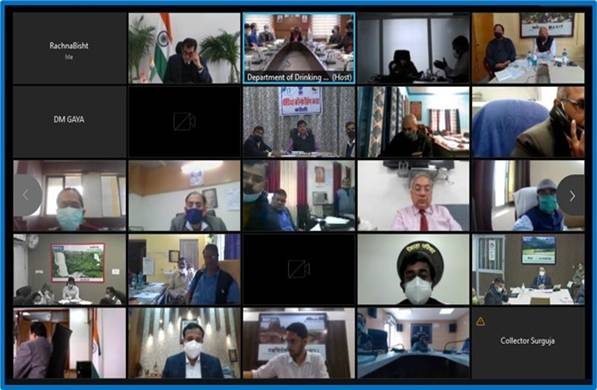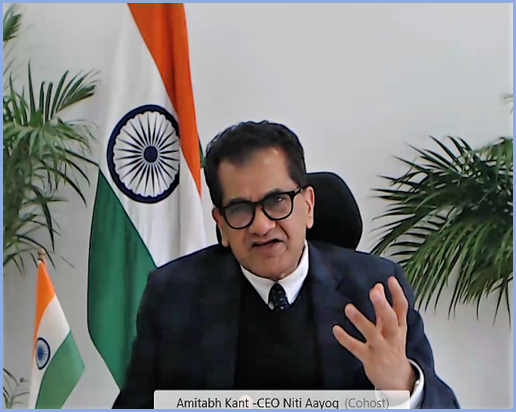The Department of Drinking Water and Sanitation, Ministry of Jal Shakti today organised a National Conference on assured portable water supply and ODF plus in Aspirational districts. CEO, NITI Ayog, Shri Amitabh Kant delivering his keynote address said that “Aspirational districts are unique in many ways and face multiple challenges. The model of working in these regions has been appreciated by many international agencies including UN. The impact of water and sanitation is multifold and directly affects health and nutrition. It is therefore important that District Collectors and policy makers provide the much-needed leadership to ensure that toilet facility and tap water reaches every rural home in the given timeline”. Smt. Vini Mahajan, Secretary DDWS, Chief Secretaries, Shri Arun Baroka, Addl. Secretary, DDWS, ACS and Principal Secretaries of States and over one thousand officials from DDWS, central ministries, NITI Ayog, State governments and CEOs/ DCs of Aspirational districts participated in the e-conference.

Setting the agenda for the conference, Smt. Mahajan appreciated the progress made by the districts in providing tap water supply to rural homes and ensuring toilet usage at all times post ODF. She said, “As both Jal Jeevan Mission and Swachh Bharat Mission are time-bound, mission mode programmes to provide tap water and sanitation facility with ‘no one is left out’ motto, it is important that consistent efforts are made by all in terms of water availability and clean toilets for long term sustainability of the programme.”
Shri Arun Baroka, Additional Secretary, DDWS presented performance of 117 aspirational districts in ODF Plus and providing tap water supply. At the time of launch of Jal Jeevan Mission on 15th August 2019 out of 3.39 Crore households in aspirational districts only 24 lakh household had access to tap water but today we are providing tap water in 1.34 Crore (39.53%) households. Three aspirational districts of Telangana and 1 district of Haryana have achieved 100% coverage. In Aspirational districts, in 5,090 villages solid waste and in 3,663 villages liquid waste management has been started.
Shri Baroka said that it is imperative for Aspirational districts to speed up the efforts and make sure that the target deadline is not missed. He emphasized that provision of tap water must be ensured in schools and anganwadi centres for drinking, cooking mid-day meal, handwashing and usage in toilets.

Shri Kumar Ashirwad, CEO, Gadchiroli, Maharashtra, Shri R K Sharma, DC, Namsai, Arunachal Pradesh, Shri Uday Praveen, DC, Udalguri, Assam and Shri Deepak Soni, DC, Dantewada Chhattisgarh shared their experience in overcoming the challenges through innovative solutions in providing clean tap water and sanitation facilities in their districts.
Jal Jeevan Mission is implemented in a decentralized manner following the ‘bottom-up’ approach, wherein the local village community plays a key role starting from planning to implementation and from management to operation & maintenance. For this, the State undertakes community activities like engaging with the community and strengthening the Pani Samiti. Emphasizing on it, Shri Amitabh Kant stressed on efforts for rejuvenation of water bodies, conservation of water sources, rainwater harvesting and augmentation of surface water. He said, “community engagement has to be the core of the programme. Social and behaviour change is important to bring about change and make the programme a Jan Andolan. It is important that all DPRs are approved by March, 2022 so that work can be taken up in speed to make all Aspirational Districts ‘Har Ghar Jal’ by March 2023.

Working in line with ‘Sabka Sath, Sabka Vikas, Sabka Vishwas and Sabka Prayas ’, Jal Jeevan Mission aims at universal access to potable tap water supply. At the start of the mission in 2019, out of a total of 19.20 Crore rural households in the country, only 3.23 Crore (17%) had tap water supply. During the last 28 months, despite Covid-19 pandemic and lockdowns disruptions, Jal Jeevan Mission has been implemented with speed and today, 5.69 Crore rural households have been provided with tap water connections. Presently, 8.93 Crore (46.34%) rural household across the country have tap water supply. States of Goa, Telangana, Haryana and UTs of Andaman & Nicobar Islands and Puducherry, D&NH and D&D have ensured 100% household tap connection in rural areas. At present, every household in 97 districts and more than 1.34 lakh villages are receiving tap water supply in their homes.
To ensure transparency and accountability in implementation of Jal Jeevan Mission, all information about Jal Jeevan Mission is in public domain and the JJM dashboard can be accessed at https://ejalshakti.gov.in/jjmreport/JJMIndia.aspx
*******
BY/AS

